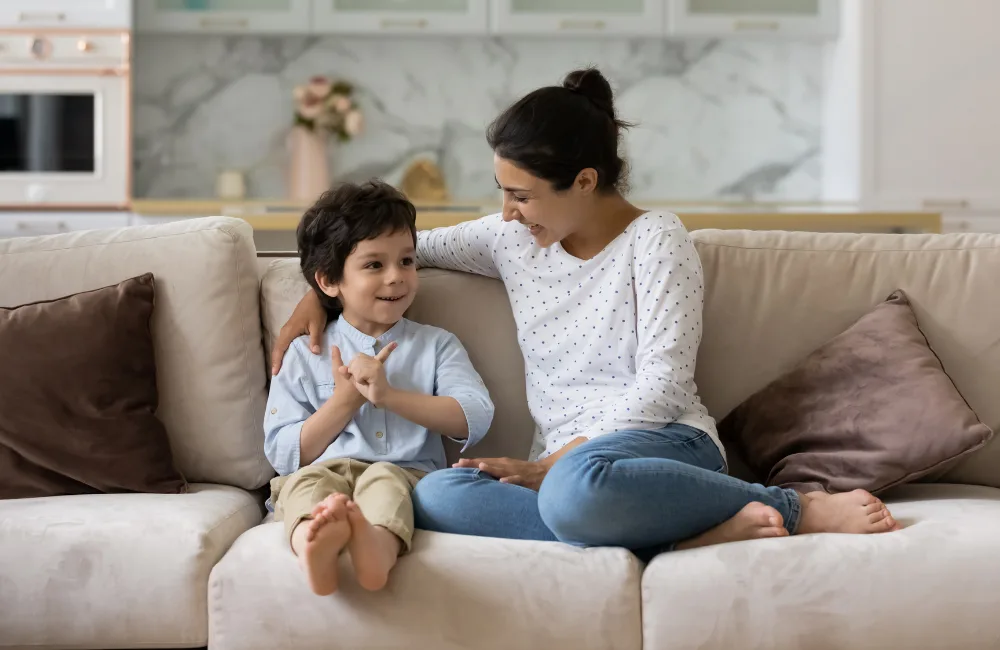
Photo Credit: Canva
By using this site, you agree to our Terms of Use. This post may contain affiliate links. Read our disclosure policy.
Follow us on Instagram for more fun ideas for kids!
Check out these tips for communicating more effectively with your child. These points can help you and your child talk more!
As a good parent, you know the importance of effective communication with your child. Effective communication is essential for raising children and teaching them to become responsible adults. It’s not always easy to know what methods will be most effective in communicating with each other, but we’ve got some tips that can help.
Listen
One of the most basic ways to show our kids that we want and even expect them to listen when they talk with us is by making eye contact while talking. This indicates that you care about listening and create an environment where conversation flows more easily because there’s no need for constant back-and-forth dialogue over who should speak next.
In addition, active listening ensures that communication between you as a parent and your child stays as open as possible. A good listener will understand what a speaker is trying to communicate and not judge them for it.
Of course, this isn’t always the case with children who are still learning how to speak. Once your child has mastered their language skills, you can start practicing these methods yourself in conversations with them as well.
Keep an open mind
It’s essential to remember that there are two sides to every story, and sometimes both parents and kids are at fault for a problem. In those cases, it’s crucial to find ways to solve the issue without resorting to blame or judgment.
Sometimes just talking through how things went down can help resolve the situation entirely. But in other cases, you may need some outside insight from an expert like a teacher or family member who isn’t directly involved with either party.
In addition, it’s also essential to teach your children that they shouldn’t put all of the blame on one person because there are usually two sides to every story. This is especially true when you feel like they aren’t honest about what went down or if their side doesn’t entirely make sense for some reason.
By teaching them this from a young age, kids will be able to avoid blaming others and vice versa when problems arise down the road.
Gather your thoughts
It can be tough to hold in your emotions and reactions when you are upset with someone, especially if a child often makes decisions that make no sense. However, thinking through what is bothering you before responding will help ensure that your words come across effectively to avoid confusing or hurt feelings.
Being angry when speaking about something isn’t necessarily a bad thing since everyone gets frustrated sometimes. However, being mean or rude on purpose won’t do anyone any favors because they might never understand their mistake after hearing those negative comments. For this reason, many guardians choose not to say anything until they have calmed down completely.
Check your tone
Most of the time, you should use a gentle tone when talking to your children. Kids can be sensitive, and they pick up on everything you say. If you scream at them or yell too much, it could have an adverse effect on how kids act around others.
Yelling also does not discipline as kids don’t process yelling the same way adults do.
Suppose you need to teach them a lesson; you need to be firm and use a no-nonsense tone of voice that is clear about what they did wrong and why it’s not acceptable.
You should also explain how their actions hurt someone or affected someone else in some way, as this will help kids understand consequences better.
Eye contact
If your kid does not make eye contact with you or wanders around the room while talking to you, it can feel disrespectful. It might be that they are shy and introverted but if this is a recurring problem, then speak with them about it to understand why it’s crucial for everyone in the family and circle of friends to respect each other by paying attention when someone else speaks.
When your child is talking to you, look them in the eye as they are speaking so that you know what they are saying without asking for clarification. Kids tend to wander around when talking with adults because there isn’t much else going on at their level other than schoolwork and television time.
It also makes sense for kids to check out from time to time, just like grownups do sometimes but don’t let them get away with not paying attention while interacting with someone else, such as family members or friends.
Repeat back
Sometimes children want or need some space, but parents have this innate desire to help and give advice whenever their kids come home with problems. Remember, not everyone is equipped with all the answers, so sometimes stepping outside yourself and trying to get where your child is coming from will further resolve issues faster.
When talking through their problem or conflict, don’t passively listen by nodding along as most likely your kid wants someone there for support without having to solve everything for them. Instead, actively listen, which means repeating what you think they are trying to communicate and asking if that’s correct.
This might feel like a game of ping pong at times, but frequently children want the opportunity to get their point across.
Use Positive language
Do not use negative language or ambiguous words like “don’t” and “no.” Instead, positively express your wants by using verbs instead of nouns when possible. For example: do not say, “Don’t jump on the couch!”; say, “Please sit down on the floor.”
Try to teach kids how you want them to behave from an early age, so they are aware of what is expected of them when they get older, it will avoid many problems later on if children know what their parents expect of them now.
Use open-ended questions that encourage conversation rather than one-word responses such as ‘yes’ or ‘no.’ Don’t give orders – ask questions and provide choices. This will encourage kids to think for themselves, which is a good skill that they can use later in life when making decisions.
There are countless means of being assertive without using negative language or authoritarian approaches.
Keep it simple
Keep your instructions simple and use clear language. Use plain vocabulary words rather than adult-sounding phrases when speaking to young children; keep things easy for them to understand.
Avoid too many complex sentences that may confuse small kids, but don’t speak too quickly either, since this will make it hard for them to follow the conversation. Finally, be sure not to forget important details like times or locations by writing those down in a visible place, so you don’t have any issues remembering.
Provide alternatives
Giving your children a sense of control will help them feel more comfortable, leading to better opportunities for communication. For instance, if you want your kid to take a bath, then give him an option of playing first before taking a shower, so they know what is expected from them and choose how their day goes.
This way, they have the knowledge of what is required of them. You can also give your children choices throughout the day regarding their clothes or food choices to feel as though they have some control over their lives.
Be assertive
When communicating, it is best to use an assertive tone of voice, which will allow both parties to feel respected while also maintaining good listening skills, so they know when it’s their turn to speak again.
You should not be vague or generalizing as children have short attention spans, so you need to keep it simple. Your child must understand what has been said by using clear language and focusing on the topic at hand rather than other distractions such as life in general.
You should keep any conversations relevant, short, and only discuss one thing at a time. It is important to listen to what your child says as this shows that you are interested in them and allows for open communication with your child regarding their thoughts on the topic of discussion.
Check for understanding
When communicating with your kid, it is best to keep checking if they understand what you are saying by making sure they are engaged and listening to you. You can also use the child’s name in your sentences and ask questions inquiring about their opinion on a specific topic or current situation.
We all know how difficult it can be to communicate with kids. They are still learning the ropes of communication, so they often get frustrated when we don’t understand them or do what they want us to do immediately. This hence requires us as parents to be very kind and calm when communicating with them.
Check out more Parenting Articles
5 Easy Ways To Raise Helpful Kids: Start Them Young
Teach Your Kids To Choose Good Friends
Positive Parenting: How Do I Fix Positivity In My Kids At An Early Age
